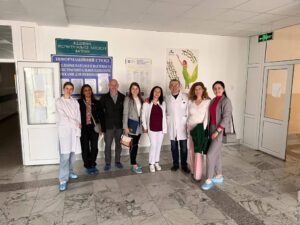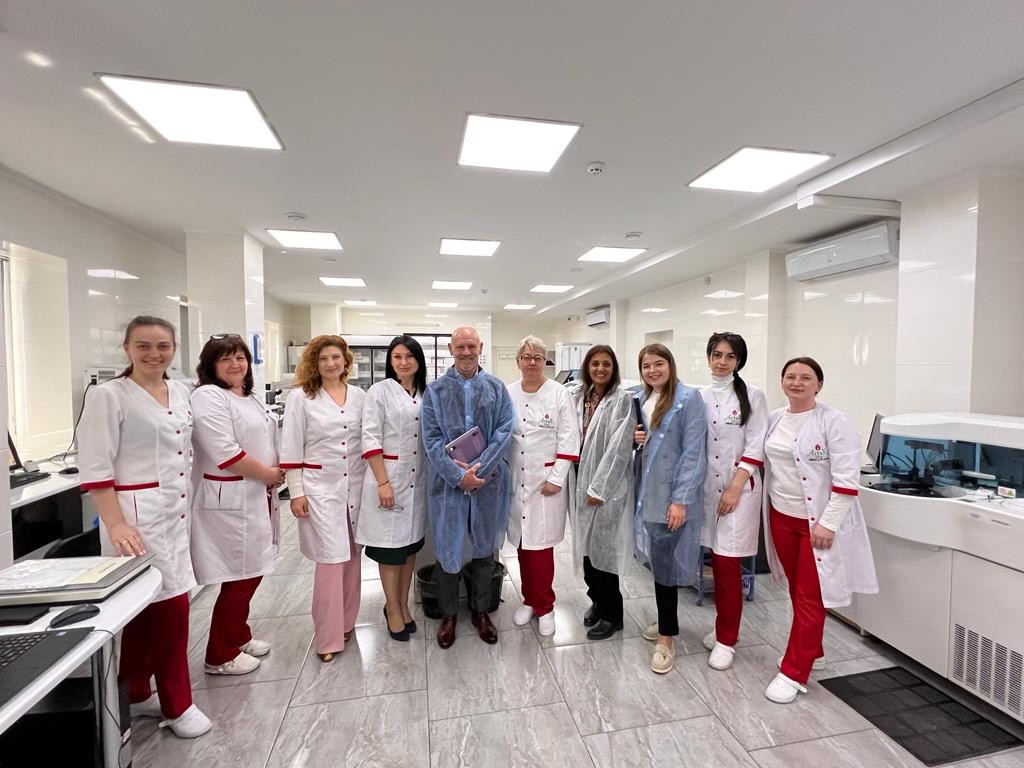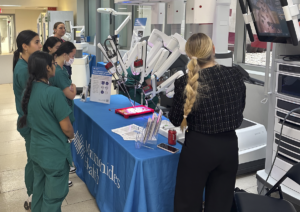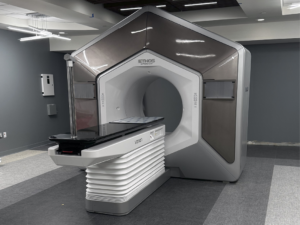At Maimonides, our mission to help patients in need isn’t just limited to those who walk through our doors. Our Social Emergency Medicine program engages with communities beyond the walls of our Emergency Department. The team is dedicated to protecting vulnerable populations and identifying health resource-poor communities, as well as sources of health inequity and socioeconomic drivers of disease.
In November, Joshua Schiller, MD, Director of Global Health and Social Emergency Medicine at Maimonides Health, led seven Maimonides doctors on a medical trip to Ukraine. The team traveled to Uzhhorod, a city in Western Ukraine, for a one-week stay during which they trained and educated hundreds of medical students and residents.
Helping Ukrainian Providers Increase Capacity to Treat Soaring Patient Volumes
 While Uzhhorod has mostly avoided direct impact from the ongoing war, the city has seen an influx of refugees from the eastern part of the country. As a result, medical professionals in Western Ukraine are seeing a huge increase in patient volume, especially for emergency conditions.
While Uzhhorod has mostly avoided direct impact from the ongoing war, the city has seen an influx of refugees from the eastern part of the country. As a result, medical professionals in Western Ukraine are seeing a huge increase in patient volume, especially for emergency conditions.
“The population in the western part of the country has roughly doubled since the beginning of the war,” said Dr. Schiller. “There’s a real need for ramped-up capacity to handle the increase in patient volume. We’re primarily focused on helping with civilians displaced by the war — patients in need of primary care that necessitates long-term follow-up and evaluation over time. We are educating local primary care physicians on emergency presentation that they may see in their clinics or urgent care centers.”
Many patients are managing long-term conditions such as hypertension, asthma, and diabetes, which local primary care specialists are well prepared to treat. Dr. Schiller and the Maimonides team supplemented this knowledge to prepare them to recognize emergency conditions, like stroke, heart attack, acute exacerbation of diabetes or asthma, and infections, among others.
“Much of the local resources, from a health care perspective, are focused on the war and supporting soldiers,” said Dr. Schiller. “But there’s a very active, very modern medical infrastructure in Ukraine that is challenged with the increased civilian volume they’re seeing, particularly in the west. With the increased volumes of patients, their capacity is currently tested to handle the number of patients that they’re seeing.”
While many health conditions are not war-related, Dr. Schiller reported that the teams of Ukrainian physicians he worked with cited patient presentations related to the stresses of war and displacement, including anxiety, depression, and suicidality, particularly with younger patients, soldiers, and families of soldiers.
“One of the first things we try to discern when we see patients like that is whether there is a physical manifestation of a psychological condition occurring, like palpitations, light-headedness, or dizziness,” Dr. Schiller said. “After lab tests and imaging, you may realize that that patient is actually exhibiting symptoms of anxiety and depression associated with the stresses of the war.”
An Expert Team Committed to Upholding Humanistic Values of Medicine
The trip was organized by International Medical Response, a nonprofit organization of which Dr. Schiller serves as Medical Director. In addition to Maimonides’ Department of Emergency Medicine, partner organizations for this trip included Zonta International and Uzhhorod National University.
International Medical Response was founded with the mission to supplement, support, and enhance healthcare systems in communities across the world that have been impacted by natural disasters, extreme poverty, or regional conflict. Through training local medical professionals and collaborating with local healthcare workers, IMR has sent teams to multiple countries, including the Philippines, Rwanda, and Haiti.
“Medicine is a language that is internationally spoken,” Dr. Schiller said. “By using medicine as a vehicle to communicate, we’re bridging geographic and political gaps. Doctors can be the ultimate diplomats, trusted by communities on both sides of political boundaries. By going to Ukraine, we are attempting to uphold the standards to which we pledged when we decided to become doctors. Healthcare workers are trained to look at the world in a humanistic way, and that is what fueled this trip and future trips.”
The team of doctors was chosen for their expertise, educational and speaking abilities, and ability to manage the stresses of practicing and educating in a potentially unstable setting. They represented a diverse range of expertise in the fields of cardiovascular care, toxicology, urogynecology, GI pathology, bariatrics, simulated practice, and others.
Not only does this experience benefit physicians and patients in Ukraine; our doctors bring back a new perspective and level of expertise to patients right here in Brooklyn.
“The more that we speak to people dealing with disease in other places, the more we understand and benefit our own practice, no matter where we are,” said Dr. Schiller.
Dr. Schiller plans to return to Ukraine in the spring, again with a team of Maimonides doctors. In the meantime, Dr. Schiller and the Maimonides team will continue to remain in touch remotely to help support the Ukrainian team’s emergency medical expertise and self-sufficiency.
For more information on Maimonides’ Social Emergency Medicine Program, visit its webpage. Visit the International Medical Response website here for more information on past, future, and ongoing medical care and training projects.




